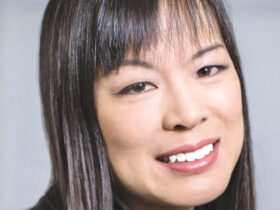The latest candidate in our series of Q&As with influential women in the technology business in Canada is Lauren Howe, Manager, Product and Business Development, Advocate for Youth in STEM, and former Miss Universe Canada
Name: Lauren Howe
Job Title: Manager, Product and Business Development. (Lauren is also a dedicated youth advocate for STEM, and former Miss Universe Canada)
Years in the Industry: 1
The Quote That Most Inspires You: “Only those who dare to fail greatly can ever achieve greatly.” (Robert F. Kennedy)
What drew you to a career in the consumer and/or business technology industry?
I had always been drawn to math and science as a kid. The original plan was to become a surgeon, but you know how life works, right? I made a last minute decision to switch to engineering knowing that down the road I could enter the business world with a background in engineering and technology. The intersection of business and technology is a fascinating space – it’s where you find the intersection of new innovative solutions and how to make them best work for humans in practice.
Have you encountered any roadblocks along the way that were related to your gender?
For the most part, I have been fortunate enough to have had very supportive leadership who never made biased decisions based on gender, which is critical for anyone going through their careers, male or female.
However, I have had some comments that have been made from those being surprised after learning I hold a degree in Industrial Engineering such as, “are you really an engineer or did you buy the Iron Ring?” It’s important to remember that at the end of the day, it’s about letting your work show for itself.
There was one experience that could potentially be considered a roadblock. After graduating university, I had interviewed at an engineering firm. After the first round of interviews went well, we did a tour of the office where I observed a lack of female representation. While it felt like a welcoming, supportive, environment, not having a female role model present in leadership was a determining factor in me not accepting a position with the company.
Technology is historically a male-dominated industry, yet the use of tech is fully embraced by women, and many studies even suggest that females are the primary buyers of tech in the home. What do you feel the technology industry needs in order to attract more women, particularly into high-level positions?
I firmly believe that diversity is critical to any company. When we have more varied opinions and perspectives as a part of the decision-making process, we will have more comprehensive products and solutions. This has been seen time and time again when teams [made up] of individuals from a select part of the population design a product – often that product isn’t designed for the masses but rather a smaller category (i.e. crash test dummies only being tested on men).
There are plenty of different suggestions on how to get more women into the tech industry. It obviously starts at an early age, teaching skills like computer programming, coding, math and sciences in a way that shows how applicable these skills are to the real world and a variety of industries. Later, it’s about supporting the women who have chosen to go down this path long enough that they can rise to higher-level positions.
If you had to sum up what it is like being a woman in this male-dominated technology industry in just a few words, what would you say?
Truthfully, I think a large number of women in male-dominated industries are fiercely supportive of one another. The focus isn’t about “this is where we are challenged” but rather on trying to achieve the best possible result. It is also critical to have support from the males in your environment as well. It makes a world of difference.
Are there women in the tech industry who inspire you?
Plenty, too many to count! Rather than focusing on the big names of women in tech, a few of the women who have directly influenced my career include Huda Bilal, Nadia Masri (this year’s cohort of Forbes 30 under 30), Melissa Sariffodeen, Stacy Woloschuk and Jodi Kovitz – just to name a few. I recently also met another inspiring young woman, Ann Makosinski, through a shared partnership. She’s a Canadian inventor who made the Forbes 30 under 30 list at just 19 years old. No big deal.
There are also the endless number of role models that can be found in every corner of the STEM world. As an industry, we need to make sure we are continuing to search out these women and promote them as best we can in order to have young girls easily find these female role models.
What are some of the misconceptions/myths about women working in the technology space that you’d like to dispel?
I think one of the biggest misconceptions about the tech space, as a whole not just for women, is that you must be an expert programmer, math expert, data scientist, et cetera. In reality, there are so many different avenues within tech.
There are so many great opportunities out there, and I recently had the chance to partner and co-host four free workshops with Google and CS First called Coding on Chromebook, where we taught kids the basics of coding. This type of class learning is a great source for individuals considering learning more about STEM.
I’ve spoken to a number of teenagers who have been discouraged early on from tech because they may not have performed well in a class, which deflated their confidence and in turn made them believe they were not “cut out” for a career in STEM. This isn’t the case whatsoever and why I’m a firm believer in individuals taking STEM-based learning outside of traditional classroom settings like Coding on Chromebook.
What’s one thing you wish was done differently in the industry, and why?
I think we are moving in the right direction, but there are two changes I would love to see happen in our educational systems surrounding STEM. The first is that computer programming needs to be taught at a much younger age. The fundamentals of computer science are not only about developing the skills that will be required for more jobs in the future, but also elevating a problem-solving mindset.
The second change is that STEM can be taught in a far more application-focused manner. I mean really, when is the last time any of us used the principles of derivatives from Calculus II? Is that more interesting than, for example, how materials engineering is disrupting the fashion and consumer goods world? I could go on about this one.
Are you optimistic for the future in general and for the industry?
Absolutely. When I entered the engineering program at the University of Toronto, they announced that our year had a record high of 33% women across the discipline. Now, that number is at 40%. Conversations are being had at the organizational level on how to get more women in the door and retain those numbers through various support systems. Another important factor is ensuring that top-level leadership is in support of diversity as a whole, not just for women.








